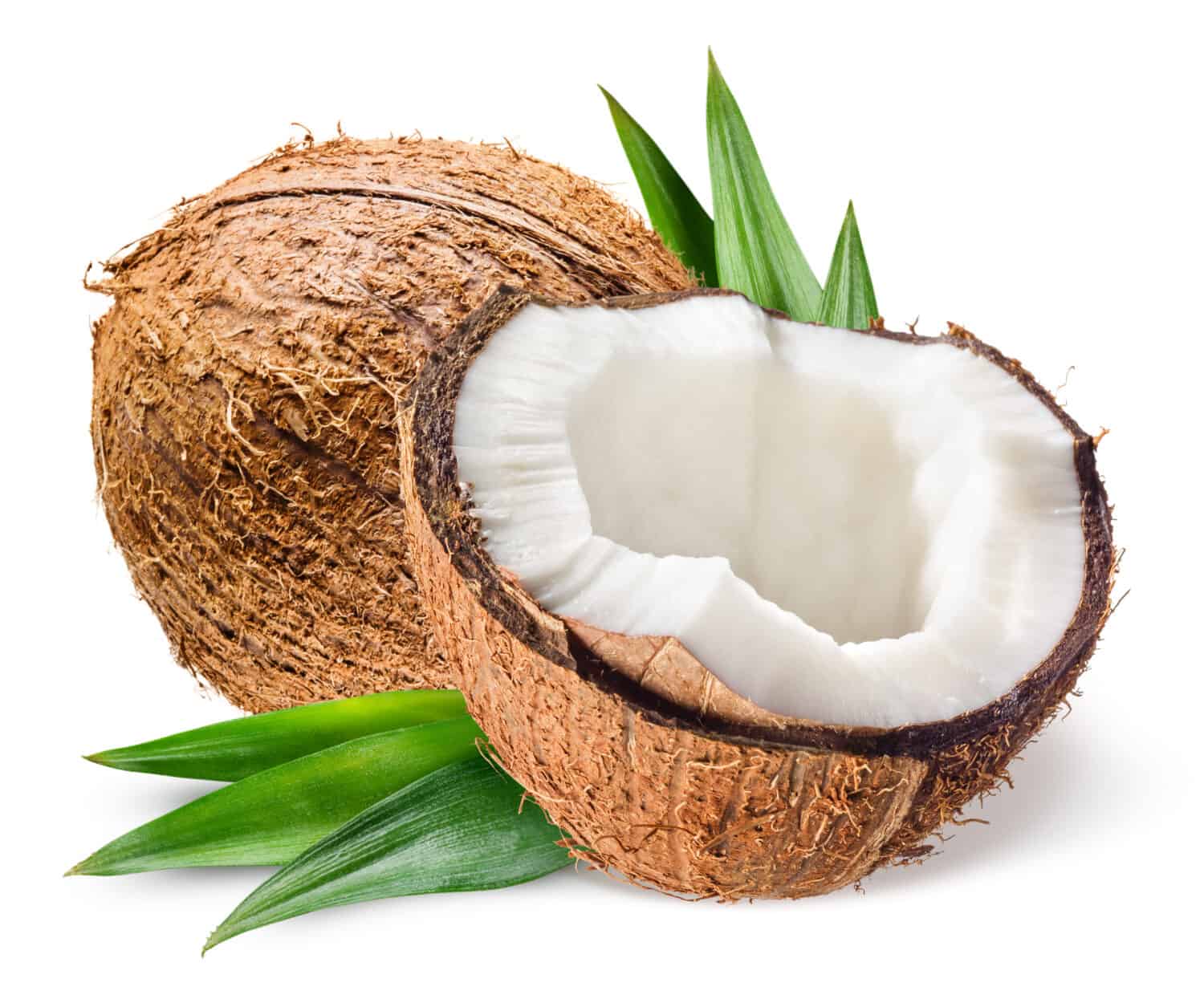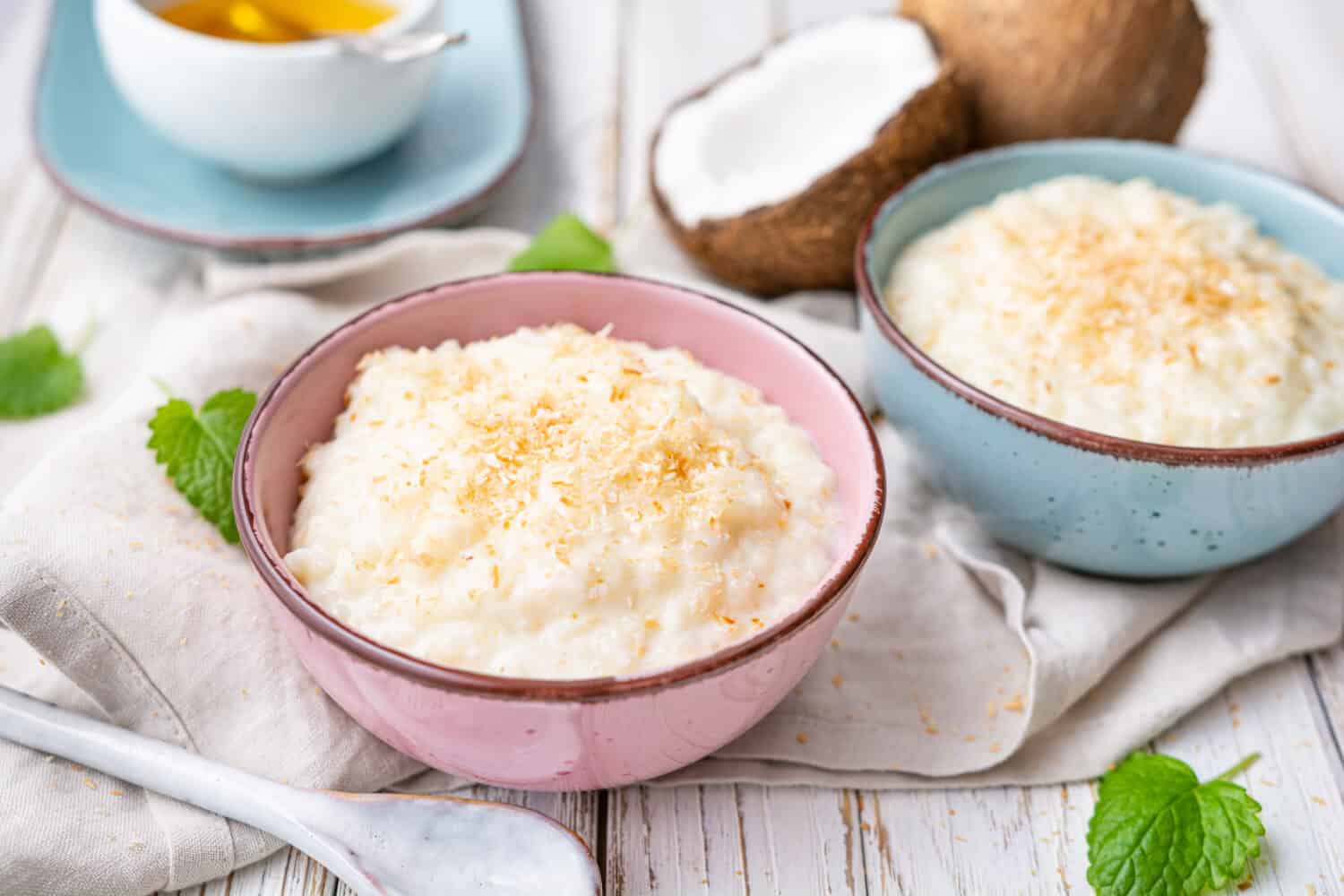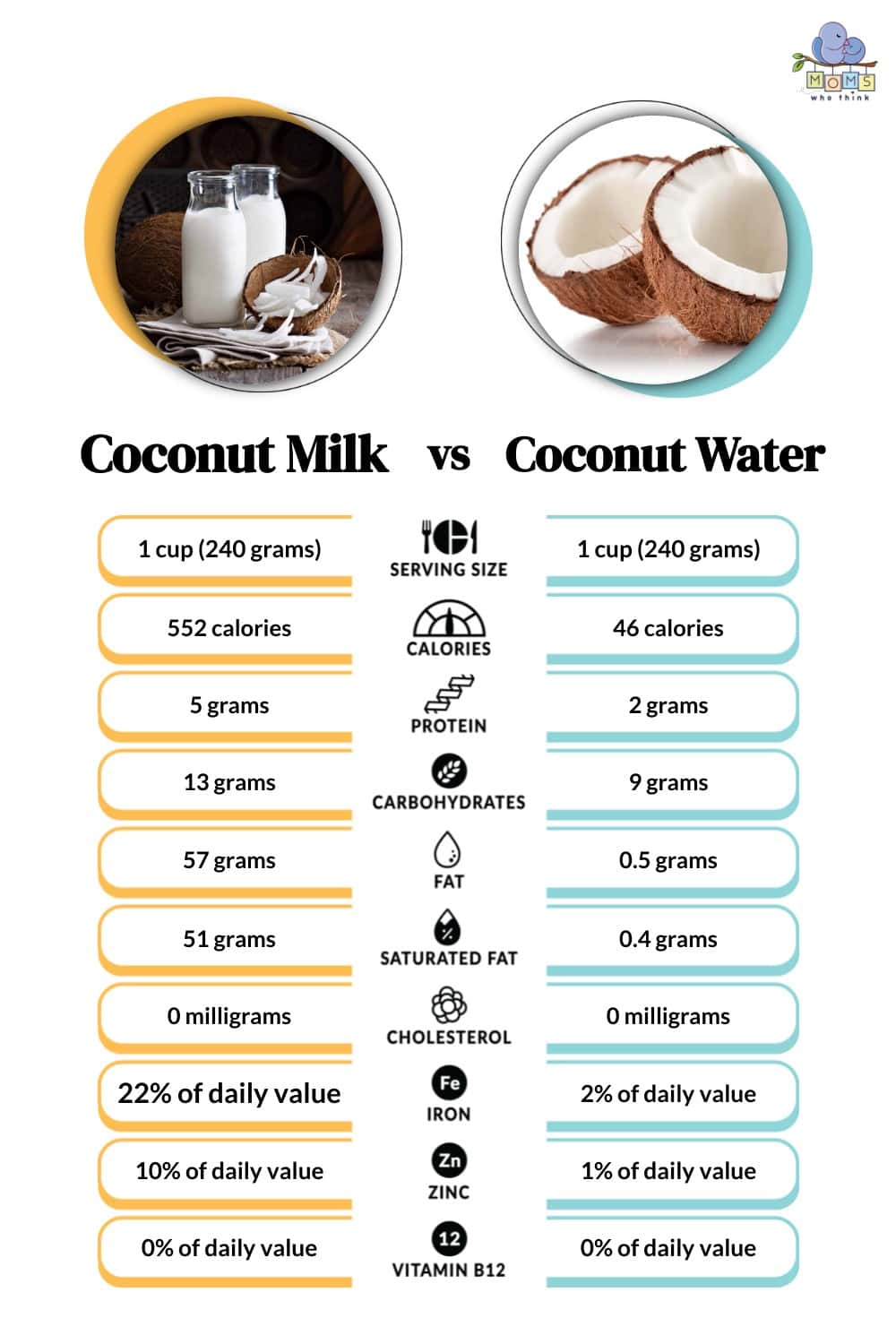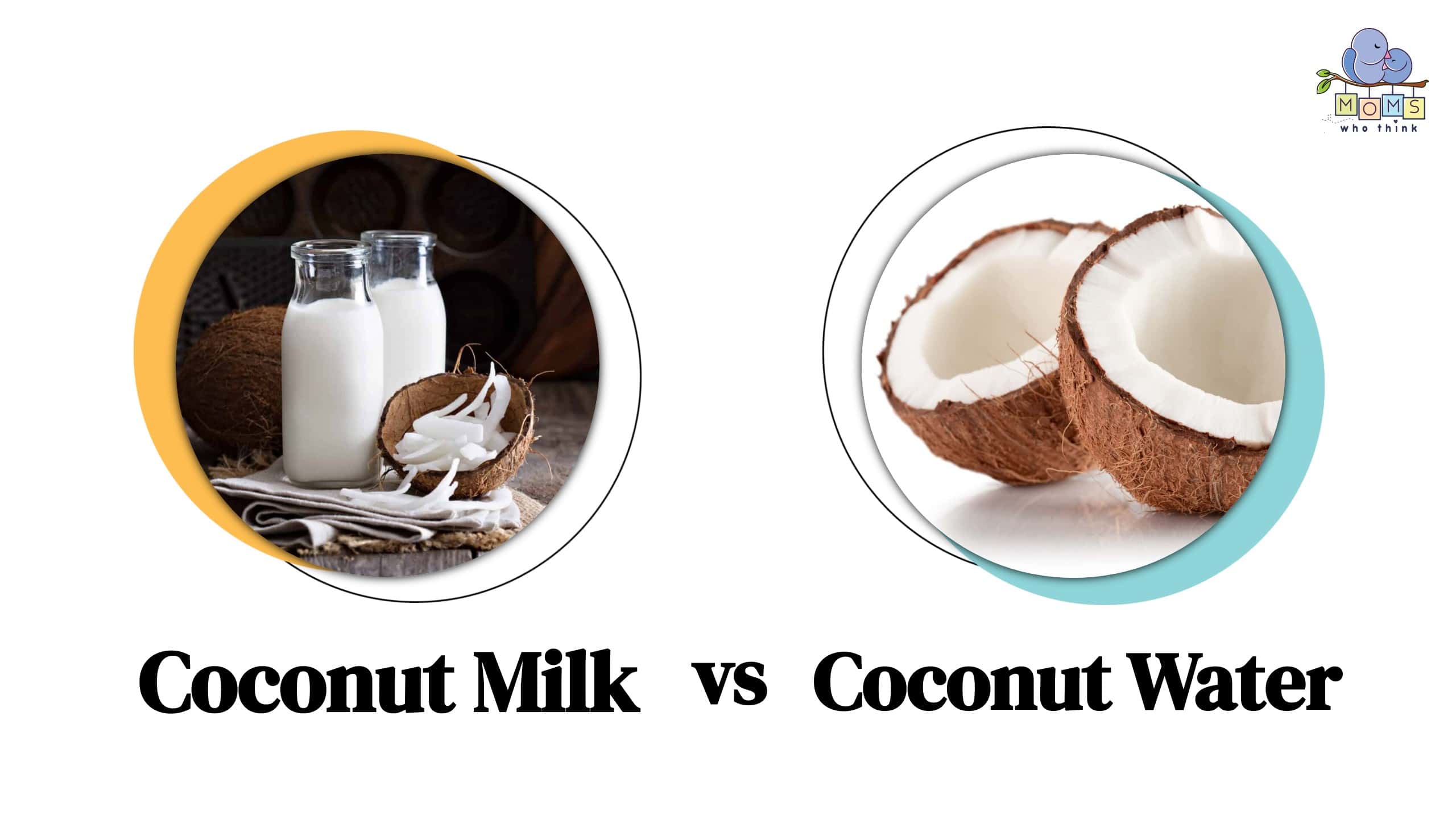While both coconut milk and coconut water come from coconuts, they have distinct differences. For starters, coconut water is a clear, slightly sweet, and fat-free liquid obtained directly from fresh coconuts. On the other hand, coconut milk is a thicker, creamy substance made by processing the flesh of the coconut. But what are other key differences between coconut milk vs. coconut water you need to know? Which is healthier? What are the pros and cons of each? This article will break it down for you. So let’s get started!
What is Coconut Milk?
Coconut milk is a thick, creamy liquid made from the white part, “the flesh” of mature brown coconuts. It is made by blending grated mature coconut flesh (the white part of the coconut) with water and then straining it to separate the liquid from the pulp. It gets its opaque color and rich taste thanks to the high oil content made mostly of saturated fat. You’ll learn more about that a little later in this article. But first, you should know coconut milk is a great substitute for cow’s milk! Why?

Coconut milk comes from the white part (flesh) of a mature coconut
©Tim UR/Shutterstock.com
Because it is free of dairy. It is also suitable for vegan (no animal products) and gluten-free lifestyles. Some kinds have added sugar, while canned coconut milk usually doesn't. And you don’t have to search high and low to find coconut milk because most major grocery store chains carry it.
So can you just cut open a coconut and extract the milk? No.
Why? Because there is a process to make coconut milk. The coconut flesh is blended with water to make coconut milk. Now there are different types. Take a look:
Full-Fat Coconut Milk
This kind is thick and rich because it has a lot of coconut cream. It's used in dishes like curries and desserts.
Light Coconut Milk
Light coconut milk is thinner and has less fat because it's mixed with more water. It's used when a lighter texture is needed.
Cream of Coconut
This is sweetened and thick coconut milk, often used in sweets and cocktails.
What is Coconut Water?
Open a young coconut and you will find its naturally clear water! Did you note the word “young”? Coconut water is found inside immature or young coconuts. Why? Because as the coconut matures, the water is replaced by the coconut meat. Coconut water is less processed than coconut milk because it comes straight from the coconut in its natural state, without the added fat from coconut pulp. Coconut water is about 94% water.

Coconut water is naturally hydrating and refreshing!
©Odua Images/Shutterstock.com
Coconut Milk vs. Coconut Water: Key Differences
Besides it’s composition as stated above, there are other key differences. For instance:
Taste and Texture
Coconut milk is known for its thick and creamy texture and has a strong coconut flavor. On the other hand, coconut water has a mild, refreshing, and slightly sweet taste. Some people describe it as almost having a floral taste to it. It is thin and watery in texture.
Fat Content
Coconut milk is relatively high in fat. And the amount of fat depends on whether it's full-fat, light, or reduced-fat as mentioned above. It's also a source of coconut oil. On the other hand, coconut water has very little fat to no fat (less than 1 gram).
Coconut Milk vs. Coconut Water: So Which is Healthier?

Coconut rice pudding is a sweet and delicious dessert!
©Marcus Z-pics/Shutterstock.com
According to Medical News Today, coconut milk supports weight loss, heart health, and is rich in antioxidants, fighting off cell damage. Coconut milk is high in fat and low in carbs, making it a good fit for low-carb, high-fat diets like keto. It's a dairy-free alternative for those who can't have cow's milk. Coconut milk contains MCTs, which help boost energy. And even though it’s made up of mostly saturated fats, it may help lower cholesterol, improve blood pressure, and reduce the risk of heart issues. However, because it’s heavy on the calorie side, it's best to have smaller servings compared to coconut water.
On the flip side, coconut water is a low-calorie beverage, containing about fifty calories per cup. It's free of fat but does have some carbs. Additionally, it's rich in essential minerals such as potassium, magnesium, and electrolytes. And like coconut milk, it also contains antioxidants. Some people find it aids digestion and can be helpful for an upset stomach. It might even help regulate blood pressure and promote kidney health. And for those times when you've overindulged, coconut water can help with hangovers. Just remember, while it has benefits, it's not a magic potion. So make sure you read the labels to whether or not its loaded with sugar and sodium. Too much of that can wreak havoc on your body!
You may want to consult with a healthcare pro before making it a regular part of your diet.
Coconut Milk vs. Coconut Water: Nutritional Value

Coconut Milk vs. Coconut Water: How to Use
Known as an international staple ingredient, coconut milk is very versatile in finding its way in many traditional recipes such as Thai, Indian, Filipino, and a variety of Caribbean tropical cuisines! For example, it can be added to curries, soups, and sauces, making for a creamy texture and rich coconut flavor. You can also use it as a dairy milk substitute in baking cakes, muffins, and bread, giving it a hint of coconut taste.
And if you’re a dessert lover, then coconut milk adds a nice touch to sweet treats like coconut rice pudding, flan, and coconut ice cream. Some people even enjoy it in beverages, from smoothies to cocktails! And guess what? It also acts as a natural thickening agent for recipes.
While coconut water doesn’t have that creamy milky texture, it is versatile too! For instance, you can enjoy it as a refreshing and hydrating drink, especially after a workout. Why? Because coconut water is chock full of natural electrolytes. You need electrolytes which are minerals that support nerves, muscles, and function. They also help manage your body’s pH balance. All of this is important for maintaining optimal health. You can also mix coconut water in with a healthy smoothie or use it to make soups or marinades tastier!
Did You Know?
You can not only taste the benefits of coconut milk, but your skin can experience it too! For example, coconut milk has natural moisturizing properties for your skin. In also soothes inflammation and softens your skin. You can contribute this to its being rich in antioxidants like vitamins C and E. It also can protect against free radical damage and promote a healthier complexion. Coconut milk can also aid in gentle exfoliation and sunburn relief.
Howeve,if you are prone to breakouts and acne, please consult with a skincare health professional, as it can be comedogenic for some individuals. To incorporate coconut milk into skincare, apply it directly or use it in DIY masks and treatments. For best results, choose pure, preservative-free coconut milk and perform a patch test for sensitive skin.
Final Thoughts
As a recap, coconut milk is a thick, creamy liquid extracted from mature coconuts, typically used in cooking and baking to enhance flavor and texture. It's calorie-dense due to its saturated fats and is popular in many dishes from savory curries to sweet-tasting desserts.
On the other hand, coconut water is a clear, naturally occurring liquid found inside young, green coconuts. While it can be mixed in sauces, coconut water gets it's renowned for its hydration benefits, containing minimal calories and fat. Packed with electrolytes like potassium, sodium, and magnesium, coconut water is a healthy choice for rehydration after exercise or as a refreshing, low-calorie drink.
Delicious Coconut Milk Recipes
Strawberry Limeade with Coconut Milk

